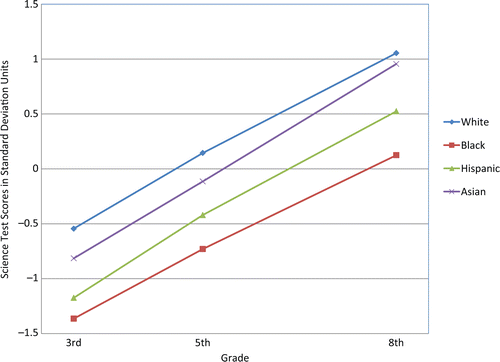Gaps in Science Education
Disparities in both reading and mathematics performance are well known. These gaps exist between Whites and Blacks, between Asians and Hispanics, between rich and poor, and between native English speakers and English language learners. What is perhaps less discussed is that this disparity is likewise evident in science. After all, achievement in science is dependent on both mathematics and reading. The gaps in science test scores are as wide as those in reading and mathematics. These have been illustrated by Paul Morgan and coworkers in an article published in 2016 in the journal Educational Researcher.
Race Gap
Income Gap
Language Gap
With the accompanying analysis of the above data, the researchers make the following observations:
Race Gap
 |
| Above copied from Morgan, P. L., Farkas, G., Hillemeier, M. M., & Maczuga, S. (2016). Science Achievement Gaps Begin Very Early, Persist, and Are Largely Explained by Modifiable Factors. Educational Researcher, 45(1), 18–35. https://doi.org/10.3102/0013189X16633182 |
 |
| Above copied from Morgan, P. L., Farkas, G., Hillemeier, M. M., & Maczuga, S. (2016). Science Achievement Gaps Begin Very Early, Persist, and Are Largely Explained by Modifiable Factors. Educational Researcher, 45(1), 18–35. https://doi.org/10.3102/0013189X16633182 |
Language Gap
 |
| Above copied from Morgan, P. L., Farkas, G., Hillemeier, M. M., & Maczuga, S. (2016). Science Achievement Gaps Begin Very Early, Persist, and Are Largely Explained by Modifiable Factors. Educational Researcher, 45(1), 18–35. https://doi.org/10.3102/0013189X16633182 |
With the accompanying analysis of the above data, the researchers make the following observations:
- A significant knowledge gap already exists when children enter kindergarten.
- Growth in science is dependent on a child's progress in reading and mathematics.
The fact that the knowledge gap in the early years predicts performance in eight grade is extremely problematic. Children of privilege have greater general knowledge and experience before they enter kindergarten and their growth in science in the elementary years is likewise helped by their better preparation in math and reading. The growth rates among various groups, however, appear to be parallel. Thus, the only way to address this disparity, as Morgan and coworkers suggest, is to start early. Less privileged children should be provided with quality preschool education that is comparable to what children of privilege experience before kindergarten.
Comments
Post a Comment